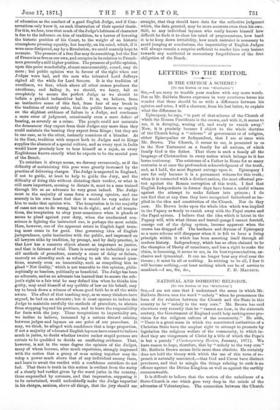LETTERS TO THE EDITOR.
IS THE CHURCH A SCHEME?
[TO THE EDITOR OF THE " SPECTATOR.1
SIR,—I am sorry to trouble your readers with any more words. But as Mr. Baldwin Brown expresses in very courteous terms his wonder that there should be so wide a difference between his opinion and mine, I will 0 Ideavour, from his last letter, to explain what the difference is.
Episcopacy, he says, "is part of that scheme of the Church of which the Roman Pontificate is the crown, and with it, it seems to me, it is decaying, waxing old, and ready to vanish away." Now, it is precisely because I object to the whole doctrine of the Church being a " scheme " of government or of religion, either Episcopalian or Independent, that I am at issue with Mr. Brown. The Church, it seems to me, is presented to us in the New Testament as a family for all nations, of which family God is the father. That there is such a family all the language of Christendom in every nation which belongs to it has borne testimony. The existence of a Father in Rome for so many centuries is at once the profoundest acknowledgment of the truth, and, as I hold, the most flagrant outrage upon it. Episcopacy I care for only because it is a permanent witness for this truth ; when it is connected with a distinct nation, the most effectual pro- test against the Roman corruption of this truth. I find that English Independents in former days have borne a useful witness against the attempt to make fathers into princes ; I do not find that at any time they have recognized fatherhood as im- plied in the idea and constitution of the Church. Nor do they now. Mr. Brown looks upon the whole idea which was implied in the Papacy as ready to vanish away with the Papal crown and the Papal system. I believe that the idea which is latent in the Papacy will, with what throes and travail-pangs I cannot foretell, emerge out of the dying system, become apparent when the crown has dropped off. The hardness and dryness of Episcopacy as a mere scheme will disappear when it is felt to have a living principle within it which has been asserting itself through all modern history. Independency, which has so often claimed to be the champion of liberty of conscience, and has a right to make the claim, is becoming, it seems to me, in its best representatives, ex- clusive and tyrannical. It can no longer bear any rival near the throne ; it must be all or nothing. In striving to be all, I fear it will become nothing,—at least nothing which can be of service to


































 Previous page
Previous page